In PHP, the implode() function is a built-in function that takes an array and converts it to a string. implode() doesn’t modify the original array.
It doesn’t matter whether the array is an indexed or associative array. Once you pass in the array to implode(), it joins all the values to a string.
PHP implode() Syntax
implode() takes in two values as parameters – the separator and the array you want to convert to a string.
The separator could be any character or an empty string. It is valid as long as you specify it in quotes. If you don’t pass in the separator, implode() still works. The array on the other hand could be an associative array or an indexed array.
NB: implode() doesn’t work with nested arrays.
The full syntax of an implode() looks like this:
implode(" ", $array);
In the syntax above, an empty space (" ") is the separator, and $array is the array.
Examples of Implode with an Indexed Array
In PHP, an indexed array is what it sounds like – each value in the array has an index automatically assigned to it. You can also assign the indexes if you want.
Below is an example of how implode() works with an indexed array:
<?php
$langs = array("PHP", "JavaScript", "Python", "C++", "Ruby");
$newLangs = implode($langs);
// Since we are printing a string, we can use echo to display the output in the browser
echo $newLangs;
?>
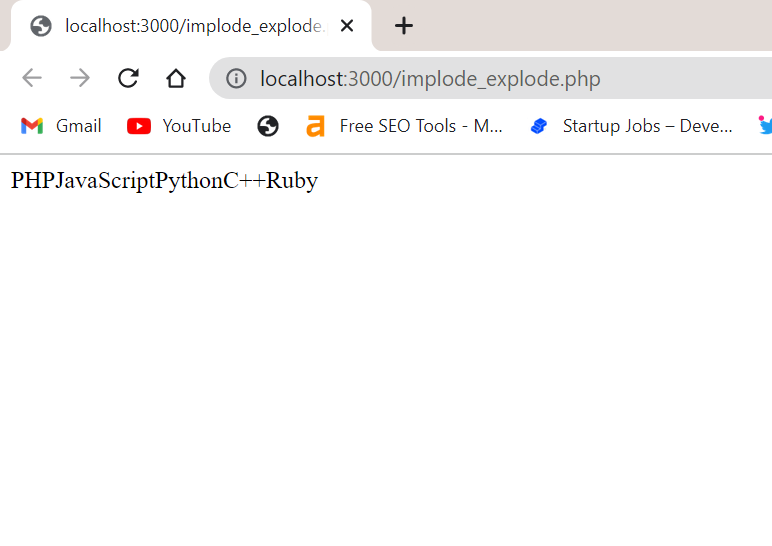
Note that I did not pass in a separator and implode() still works fine.
In the example below, I passed in an empty space, comma, and hyphen as separators:
<?php
$langs = array("PHP", "JavaScript", "Python", "C++", "Ruby");
$newLangsSpace = implode(" ", $langs);
$newLangsComma = implode(", ", $langs);
$newLangsHyphen = implode("-", $langs);
// Since we are printing a string, we can use echo to display the output in the browser
echo $newLangsSpace."<br>"."<br>";
echo $newLangsComma."<br>"."<br>";
echo $newLangsHyphen ."<br>";
?>
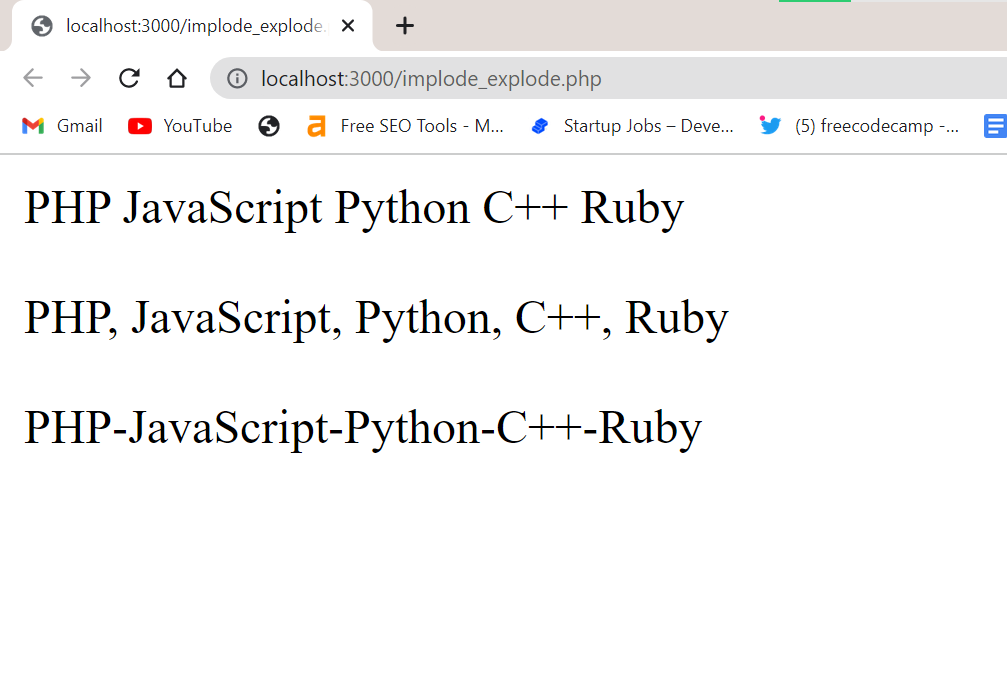
You can see it’s better to specify a separator so you can see the values well.
Examples of Implode with an Associative Array
You define a named index with an associative array. Let’s see how implode() works with associative arrays.
<?php
$person = [
'first_name' => "Kolade",
'last_name' => "Chris",
'likes' => "football and Pro-wrestling",
'email' => "kolade@gmail.com",
];
//That's not my email. Don't bother sending me a message.
$newPerson = implode(" ", $person);
echo $newPerson."<br>";
?>
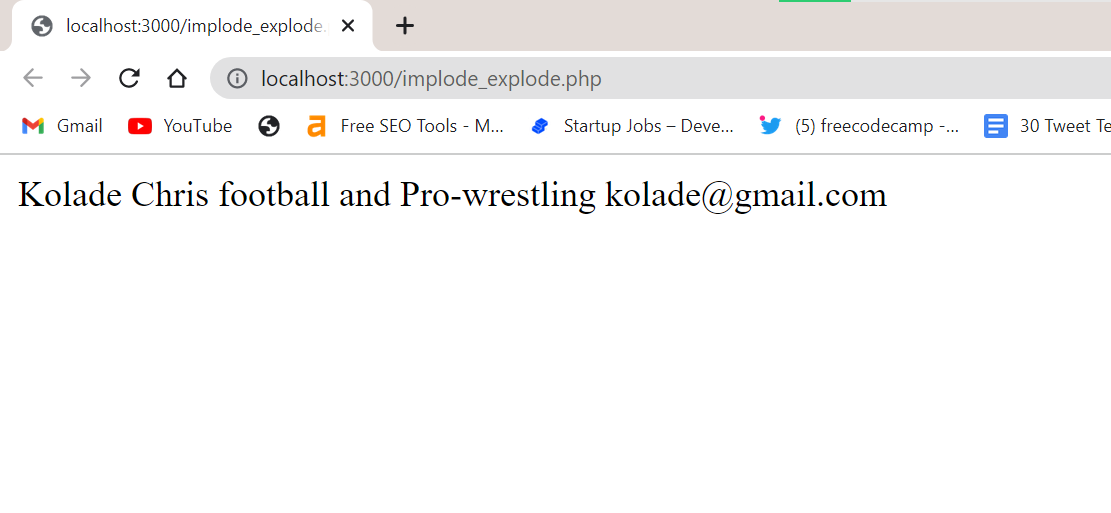
You can see the indexes were not printed. To print the indexes too, you need to attach the array to the array_keys() method while printing the array:
<?php
$person = [
'first_name' => "Kolade",
'last_name' => "Chris",
'likes' => "football and Pro-wrestling",
'email' => "kolade@gmail.com",
];
// That’s not my email. Don't bother sending me a message.
$newPersonValues = implode(", ", $person)."<br>";
$newPersonKeys = implode(", ", array_keys($person));
echo $newPersonKeys."<br>";
echo $newPersonValues;
?>
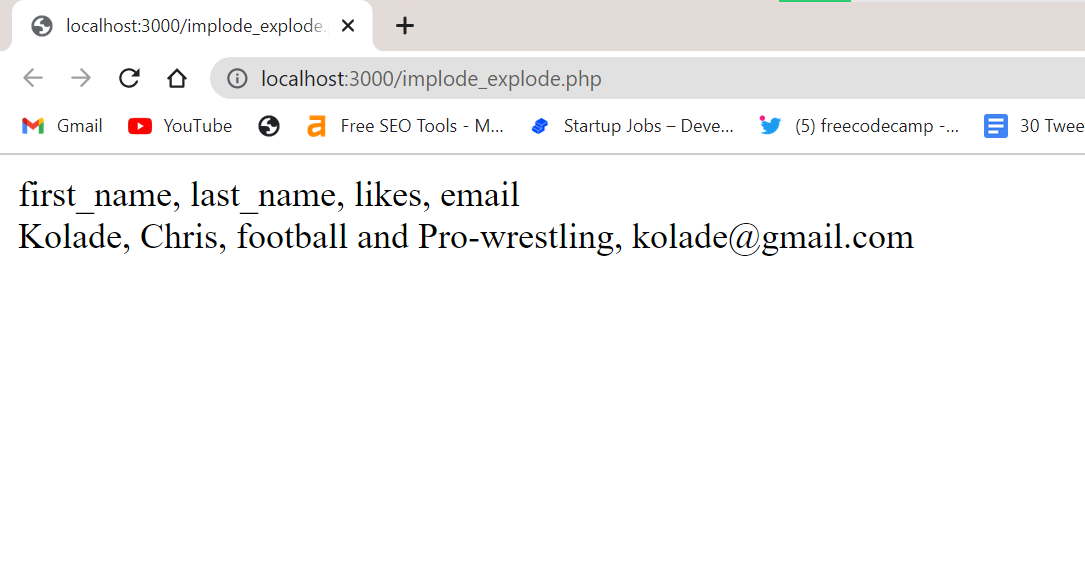
To prove that the original array is never modified, I’ll print the array alongside the imploded variables:
<?php
$person = [
'first_name' => "Kolade",
'last_name' => "Chris",
'likes' => "football and Pro-wrestling",
'email' => "kolade@gmail.com",
];
// That's not my email. Don't bother sending me a message.
$newPersonValues = implode(", ", $person)."<br>";
$newPersonKeys = implode(", ", array_keys($person));
echo $newPersonKeys."<br>";
echo $newPersonValues."<br>";
print_r($person);
?>
You can use the PHP View Chrome extension to format your printed array so it can look better:
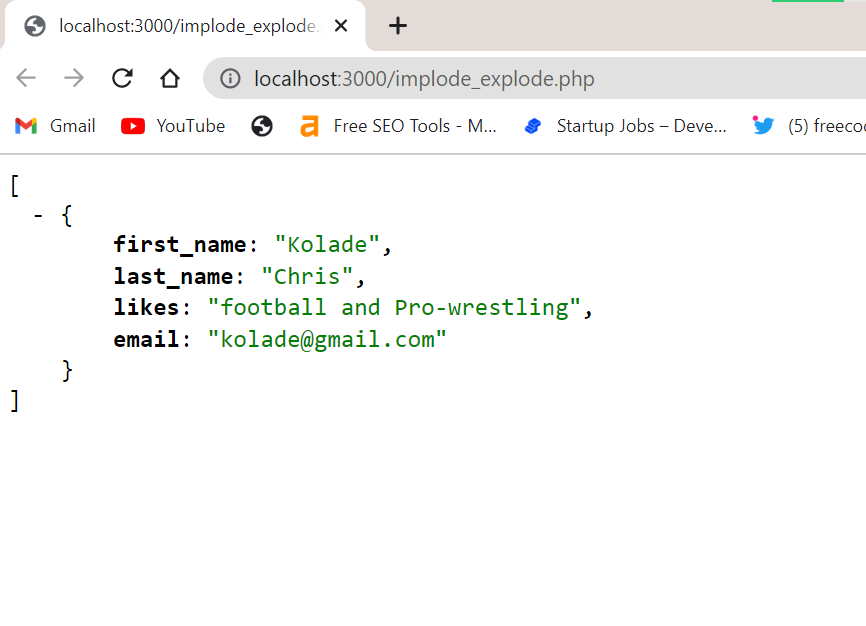
Final Thoughts
In this article, you learned about the implode() function in PHP and how it works. We looked at how the implode() function works with both indexed and associative arrays, too, with examples.
Don’t forget that implode() doesn’t work with nested arrays (multidimensional arrays). In fact, I can prove it:
<?php
$persons = array (
array("Kolade", 22, 03),
array("Yemi", 15, 12),
array("Cook", 07, 01),
array("Oliver", 19, 01)
);
$newPersons = implode($persons);
print_r($newPersons);
?>

It doesn’t work that way because implode() only works with flat arrays ([ ]) instead of multidimensional arrays ([ [ ] ]). Implode looks at the first array, and once it sees that the first array has many arrays in it, it throws an error.
Thank you for reading.

